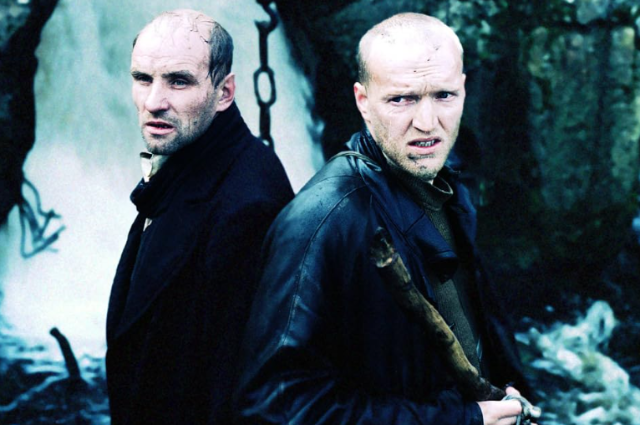Based on Strugatsky brothers’ novel ‘Roadside Picnic’, Andrei Tarkovsky’s last film, Stalker released in 1979 proves its significance even in the contemporary world. The film stars Alexander Kaidanovsky (Stalker), Anatoly Solonitsyn (Writer) and Nikolay Grinko (Professor). Stalker has impacted the world of cinema and is accepted amongst critics and filmmakers with high regard. The film earned a place in the ‘100 Great Films of All Time’ poll of the ‘British Film Institute’ (BFI).
Tarkovsky was known for experimenting with deep philosophical and sci-fi genres. Stalker is a thought-provoking film delving in devotion and categorizing the priorities of life the way it should be placed. It explores the tragedies and hopelessness of humans, alongside jabbing the atrocities of the natural world in the possession of the same unfortunate human beings. Tarkovsky won hearts for the direction and the mesmerizing long takes. Through the visual symbolism and an ardent narrative, Stalker indulges in deep philosophical themes. It challenges our perceptions of truth by blurring the line between illusion and reality.
In summary, the film is about a guide, referred to by the name Stalker, who takes people to the Zone, a forbidden place, where it is believed that people’s wishes come true. The story revolves around the Stalker and the two people, Professor and Writer who he takes with him to the Zone, and the obstacles they face that test their beliefs.
The film holds a lot of value in today’s time, when constant development has taken over every person’s life and turned it into a rat race. Whilst we run on a ramp leading to success, Stalker gives us a message to slow down. The complexities of life can be so overwhelming sometimes, that it becomes important to reflect and understand what really matters. The overlooked hopelessness, if not acknowledged, can cause inherent suffering. We are so professionally driven that we often forget to process the exhaustion that keeps piling up, and further turns into frustration. Tarkovsky, through his film, entreats us to find our true selves and define our actions. True happiness can be found when we begin to find ourselves.
The Stalker is an incentivising character. Despite his own despondency, his fervour commitment to keep the Zone a safe haven for those with a strong belief system has the ability to make one wonder about the existence of magic. His certitude in the power of the Room, a place within the Zone where wishes come true, is inspiring. Our inexperience and unfaithfulness towards miracles makes the human race a bunch of robots. We often forget that miracles exist around us in the form of nature. And nature is god. Everything around us is the sum and substance of Mother Earth. But, we are so busy exploiting nature for our sanative and analeptic benefits that we have started seeing it as our property to misuse. We ignore the enchantments in the serenity of nature. It’s like a magical tapestry that weaves together moments of serenity and inspiration. For environmental sustainability and also for the betterment of human life, implementation of the values of the film ‘Stalker’ is a necessity in the contemporary world.
The interpretation of life in this film is in contrast to the current accepted reality. If understood by all, this interpretation can make great changes in the way we look at the world. The dialogue by the Stalker defining this interpretation goes like this, “Hardness and strength are death’s companions. Flexibility and softness are the embodiment of life. That which has become hard shall not triumph.”
No quote can ever surpass the way this dialogue describes the significance of kindness. Kindness is a stranger in today’s world. It’s a virtue possessed by a few, and received by a handful of people. But, if we all gather up courage to be soft and vulnerable, the world can be an ideal place to live in. The attributes of all the three characters, the Stalker, the Professor and the Writer nudge a person to retrospect and contemplate. Their individual thought processes, although contradicting, are a stockpile of treasure.
“Mankind exists in order to create works of art.”
In my interpretation of this dialogue, anything can be termed as art if it’s a creation of a new thing, done not only with the help of skills, but the love for that work. The film explores existential themes strong enough to make us introspect. If we are willing to self-reflect and search for the purpose of our lives, we will be the creator of an art which we will be proud of.
Andrei Tarkovsky was inspired by film directors like Robert Bresson, Ingmar Bergman and Luis Buñuel. He called their films ‘an expression to what is deep inside those we call the audience.’ Stalker is one of those films. Stalker was initially not received well by the State Committee of Cinematography of Russia, also known as Goskino, for its pace. But, Tarkovsky was confident about what he wanted his film to be like. It is safe to say now that Tarkovsky’s confidence was channeled in the right direction.
In conclusion, it can be said that our inner journey towards self discovery and transformation can be initiated when we break the limitations of human understanding and give a chance to exploration. That’s what has brought us this far, and that’s what will help us comprehend each other better.
To close the article, I would like to quote English author, Geoff Dyer, who was so influenced by the film that he wrote a book about it, ‘Zona: A Book About a Film About a Journey to a Room’. He writes,
“It's not enough to say that Stalker is a great film - it is the reason cinema was invented.”

